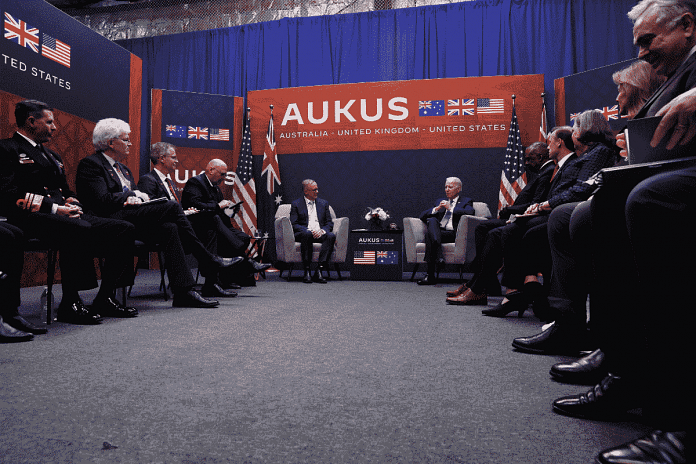New Delhi: In one of the most geopolitically significant military deals, Australia has signed a tripartite contract with the US and the UK to acquire, operate and eventually build at least eight conventional armed nuclear-powered submarines (SSN) to counter a combative China in the Indo-Pacific region.
Spread over several years, the estimated USD 245 billion deal envisages the sale of American US Virginia class submarines to Canberra and the development of a new nuclear-powered submarine that will be the future underwater vessel for both the UK and Australia.
Australian Prime Minister Anthony Albanese announced the deal in San Diego when he met American President Joe Biden and UK Prime Minister Rishi Sunak.
Today in San Diego, alongside President @JoeBiden and Prime Minister @RishiSunak, I announced the next steps for AUKUS. A new chapter in the friendship between the Australia, the US, and the UK. pic.twitter.com/p8vlLpjfU7
— Anthony Albanese (@AlboMP) March 13, 2023
The contours of the arrangement, which comes under the AUKUS, a security pact between these three countries in 2021 to ensure a “free and secure” Indo-Pacific, were formalised Monday.
This would be the first time that the US will share nuclear-propulsion technology since it did so with Britain in the 1950s.
The deal has drawn a sharp reaction from China, which has called it a “serious nuclear proliferation”.
Also Read: Blinken backs Modi’s line on multilateralism in crisis, but says there are ‘workarounds
The four-phase plan
A statement the White House issued Monday detailed the multi-phase plan agreed to by the three countries.
In the first phase, which starts this year, Australian military and civilian personnel will embed with the US Navy, the UK Royal Navy, and, subject to any necessary arrangements, within the US and UK submarine industrial bases.
This, the White House said, will accelerate the training and development of Australian personnel to ensure the ability to work together and will allow Australians to take on the responsibilities associated with these programmes.
The US Navy will also increase SSN ports beginning this year, with Australian sailors joining US crews for training and development while the UK will increase visits to Australia beginning in 2026.
Starting early next year, the US and the UK will establish a rotational presence of one UK Astute class submarine and up to four US Virginia class submarines at HMAS Stirling near Perth, Western Australia. This initiative will be known as ‘Submarine Rotational Force-West’ (SRF-West).
In the third phase, beginning early 2030s, the US will sell Australia three Virginia class submarines, built by General Dynamics, with the potential to sell up to two more if needed.
The last phase involves designing and manufacturing a new class of SSNs called the SSN-AUKUS.
SSN-AUKUS will be the future attack submarine for both Australia and the UK, with both countries intending to build SSN-AUKUS in their domestic shipyards before the end of this decade.
According to the plan, the UK intends to deliver its first SSN-AUKUS to its navy in the late 2030s and Australia plans to deliver the first Australian-built one to the Royal Australian Navy in the early 2040s. BAE Systems and Rolls-Royce will build the new class of submarines.
According to The Guardian, the nuclear reactors that will power the SSN-Aukus submarines will not be built in Australia but will arrive from either the UK or the US in a welded power unit. Additionally, they will not require re-fuelling during their expected lifetime, it said.
China and France both miffed
The development comes two years after Australia, which prides itself in being a nuclear-free country, was originally in talks with France for buying conventionally powered diesel-electric submarines.
But in 2021, the US crept into the talks and wooed away Australia with the AUKUS deal — an act that France called betrayal.
Ashley Townshend, a senior fellow for Indo-Pacific security at the US think tank Carnegie Endowment, described the contract as, “one of the most significant US and allied force posture steps in recent years”.
The #AUKUS Submarine Rotational Forces-West is the most important near-term contribution to bolstering deterrence in the Western Pacific in the entire AUKUS construct–and one of the most significant US and allied force posture steps in recent years. A short 🧵1/ pic.twitter.com/3u7aYs6lE7
— Ashley Townshend (@ashleytownshend) March 13, 2023
Meanwhile, China has reacted strongly to the deal, calling it a “blatant act” that constitutes “serious nuclear proliferation risks”.
The nuclear submarine cooperation plan released today by #AUKUS is a blatant act that constitutes serious nuclear proliferation risks, undermines international non-proliferation system, fuels arms races, and hurts peace and stability in the region.
— Chinese Mission to UN (@Chinamission2un) March 13, 2023
(Edited by Uttara Ramaswamy)
Also Read: Ties with China ‘complex’ despite talks, Pakistan ‘vilifying India’: MEA annual report



